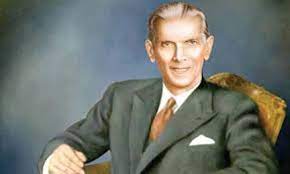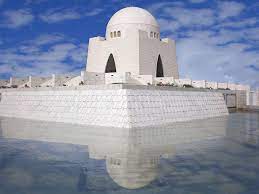**Quaid-e-Azam Muhammad Ali Jinnah: Architect of Pakistan's Destiny**
In the annals of history, few figures stand as tall and commanding as Quaid-e-Azam Muhammad Ali Jinnah, the founding father of Pakistan. Born on December 25, 1876, in Karachi, Jinnah emerged as a statesman of unparalleled vision, resilience, and determination, shaping the destiny of a nation and leaving an indelible mark on the map of South Asia.

*Early Life and Legal Career:*
Jinnah's journey began in a middle-class Gujarati family, where he exhibited early signs of leadership and an unyielding spirit. After obtaining his education in law in England, he embarked on a successful legal career in Bombay. His prowess as a barrister earned him a reputation for eloquence and sharp legal acumen, laying the foundation for his future role as a political luminary.

Quaid-e-Azam Muhammad Ali Jinnah: The Architect of Pakistan
Quaid-e-Azam Muhammad Ali Jinnah, often simply referred to as the Quaid, remains a titan of Pakistani history. To delve into his life is to explore the very fabric of the nation itself, understanding the motivations, triumphs, and complexities that shaped his legacy.

A Lawyer's Edge: Born in Sindh in 1876,
Jinnah's early life was marked by education in Karachi and Bombay, followed by an illustrious legal career in London. His brilliant legal mind and persuasive arguments earned him the title of "The Lion of Bombay." Yet, his focus soon shifted towards advocating for the Muslim community in British India.
Fighting for Representation:
Entering politics in the early 1900s, Jinnah initially embraced Hindu-Muslim unity, working for a unified India with safeguards for minorities. However, growing Hindu nationalism and perceived Muslim marginalization led him to advocate for a separate Muslim state. The rise of the Muslim League and the Lahore Resolution in 1940 cemented this vision, with Jinnah emerging as the undisputed leader.
Negotiating Independence:
As World War II concluded and British withdrawal loomed, Jinnah's negotiating skills came to the fore. He skillfully navigated complex political landscapes, facing opposition from within the Muslim community, other political parties, and the British themselves. His unwavering commitment to a separate Muslim state, coupled with his strategic negotiations, ultimately led to the creation of Pakistan in 1947.
Challenges and Legacy:
The newly formed Pakistan faced immense challenges – mass migration, internal conflicts, and economic hardship. Despite these difficulties, Jinnah laid the foundation for a democratic and vibrant state. He emphasized unity, tolerance, and the rule of law, leaving behind a blueprint for progress and a resilient nation.
Beyond a Political Figure:
Jinnah's legacy transcends his political achievements. He remains a symbol of resilience, determination, and unwavering belief in his cause. His speeches continue to inspire generations, particularly his famous address to the first Constituent Assembly of Pakistan, which outlined the principles of a just and equitable society.
Understanding the Quaid,
however, requires acknowledging the complexities of his persona. He was a charismatic leader, yet often perceived as aloof and authoritarian. His vision for Pakistan was inclusive, yet the historical context of partition casts a shadow over his legacy.
Therefore,
appreciating Jinnah's multifaceted life demands critical analysis and open-mindedness. By embracing both his triumphs and shortcomings, we gain a deeper understanding of the man who shaped a nation and whose influence continues to guide Pakistan's journey.
This exploration of Quaid-e-Azam Muhammad Ali Jinnah
is just a beginning. To truly discover his impact, one must delve into his speeches, writings, and the multitude of perspectives on his life and legacy. By doing so, we engage in a vital conversation about the history of Pakistan, its present challenges, and the aspirations it carries for the future.
Remember, the Quaid's story is not set in stone;
it is an ongoing narrative, ever-evolving as new generations interpret his words and actions. This ongoing dialogue ensures that the legacy of Muhammad Ali Jinnah, the architect of Pakistan, remains relevant and inspiring for generations to come.
*Political Awakening:*
Jinnah's foray into politics was marked by a commitment to secularism and the protection of minority rights. Initially aligned with the Indian National Congress, he later became disenchanted with what he perceived as a lack of representation for Muslims. This disillusionment led him to champion the cause of a separate nation for Muslims, a vision that would crystallize into the demand for Pakistan.
*The Lahore Resolution and Pakistan's Birth:*
At the historic Lahore Session of the All-India Muslim League in 1940, Jinnah presented the Lahore Resolution, calling for the creation of an independent Muslim state. This momentous event laid the groundwork for the eventual birth of Pakistan. Jinnah's steadfast determination and political acuity navigated the complex negotiations with the British and the Congress, culminating in the creation of Pakistan on August 14, 1947.
*Nation-Building and Leadership:*
Assuming the role of Pakistan's first Governor-General until his death in 1948, Jinnah faced the colossal task of nation-building. His leadership during the tumultuous early years of Pakistan set the tone for the fledgling nation. Jinnah advocated for the principles of unity, faith, and discipline, emphasizing the importance of equal rights for all citizens, regardless of their religious or ethnic background.
*Legacy of Tolerance and Pluralism:*
Jinnah's vision for Pakistan was one of tolerance and pluralism. In his famous speech to the Constituent Assembly in 1947, he declared that citizens were free to practice their religion, emphasizing the importance of equal rights for all. This commitment to inclusivity remains a cornerstone of Pakistan's identity and is enshrined in its founding documents.
*Personal Attributes and Style:*
Beyond his political acumen, Jinnah was known for his impeccable style and dignified demeanor. Whether in a three-piece suit or traditional sherwani, he exuded a quiet authority. His speeches were marked by eloquence and a clarity of vision that resonated with people across diverse backgrounds.
*Lasting Impact:*
Quaid-e-Azam Muhammad Ali Jinnah passed away on September 11, 1948, leaving behind a legacy that transcends borders. His role in the creation of Pakistan and his vision for a nation built on principles of justice and equality continue to shape the country's trajectory. His mausoleum in Karachi stands as a solemn tribute to a leader who, against all odds, carved a nation out of the tapestry of history.

In commemorating Quaid-e-Azam's legacy, we reflect on a man whose determination, foresight, and unwavering commitment to justice left an indelible imprint on the course of South Asian history. As Pakistan continues its journey, the spirit of Quaid-e-Azam Muhammad Ali Jinnah remains an enduring source of inspiration for generations to come.



You must be logged in to post a comment.